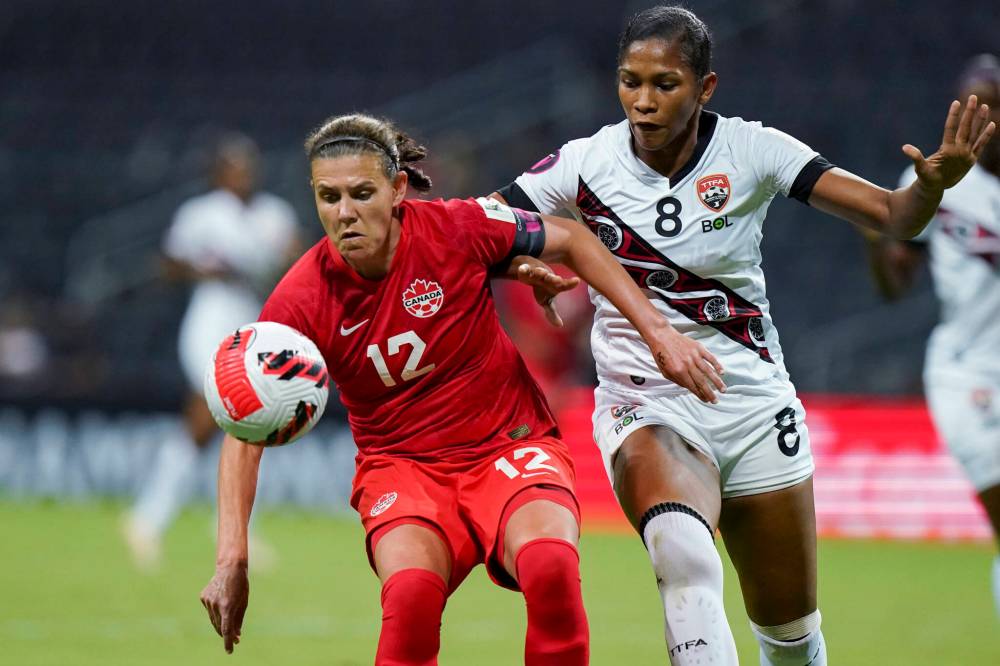Women’s soccer plagued by unnecessary adversity
Advertisement
Read this article for free:
or
Already have an account? Log in here »
To continue reading, please subscribe:
Monthly Digital Subscription
$1 per week for 24 weeks*
- Enjoy unlimited reading on winnipegfreepress.com
- Read the E-Edition, our digital replica newspaper
- Access News Break, our award-winning app
- Play interactive puzzles
*Billed as $4.00 plus GST every four weeks. After 24 weeks, price increases to the regular rate of $19.00 plus GST every four weeks. Offer available to new and qualified returning subscribers only. Cancel any time.
Monthly Digital Subscription
$4.75/week*
- Enjoy unlimited reading on winnipegfreepress.com
- Read the E-Edition, our digital replica newspaper
- Access News Break, our award-winning app
- Play interactive puzzles
*Billed as $19 plus GST every four weeks. Cancel any time.
To continue reading, please subscribe:
Add Free Press access to your Brandon Sun subscription for only an additional
$1 for the first 4 weeks*
*Your next subscription payment will increase by $1.00 and you will be charged $16.99 plus GST for four weeks. After four weeks, your payment will increase to $23.99 plus GST every four weeks.
Read unlimited articles for free today:
or
Already have an account? Log in here »
Hey there, time traveller!
This article was published 07/04/2023 (929 days ago), so information in it may no longer be current.
It is a vital match that almost didn’t happen. In the month-and-a-half since it was scheduled, Canadian soccer has been shaken to its core.
On Tuesday in Le Mans — in a stadium named after Marie Marvingt, who dressed as a man to fight in the First World War — Canada’s women’s national team will face hosts France (2:00 p.m., OneSoccer) in Canada’s first game since playing the SheBelieves Cup under protest during the winter.
They’ll do so with high-profile absences in key outfield positions, but with a number of players delivering standout seasons at their clubs; while wearing the insults of the association meant to support them, but inspiring everyone else they encounter, including their on-field opponents.

Fernando Llano / The Associated Press Files
Christine Sinclair (left), the longtime face of Canadian women’s soccer, has never been more important to the national team as she is now.
This group, these reigning Olympic gold medalists, shouldn’t have to perform in a state of constant juxtaposition. That they do, and with such remarkable dignity, is yet another reminder they continue to carry the water for the sport in this country, that they are its primary changemakers, visionaries and conscience.
They can grab immediate national attention. They can compel presidents to resign. They can oblige the subpoenas of executive-level decision-makers to parliamentary hearings. In their spare time — or, at least, severely underpaid time — they listen to national anthems atop podiums.
So far, Tuesday’s friendly is their only game on the calendar between now and the World Cup in July. Needless to say, it’ll be played with a chip on the shoulder.
Captain Christine Sinclair, who will turn 40 before her side’s first group stage game against Nigeria in Melbourne, probably thought she’d be further into retirement by now than perhaps the most important battle of her career.
Told she’d been “bitching” about pay equity by former Canada Soccer president Nick Bontis, she’s had to muster all of her considerable leadership skills in order to guide her teammates through boardroom buffoonery as well as in-game adversity. Keeping in mind the magnificence of her career, she has never been as important to the women’s squad as she is right now.
Purely as a player, Sinclair’s ongoing reinvention as a central midfielder has been on impressive display this term at Portland Thorns. She’s been operating even further back than she already does with the national team, and her unbeaten club has benefited from her positional smarts, range of passing and confidence in the tackle.
Canada manager Bev Priestman might’ve been tempted to use her in a similar role on Tuesday and through the summer, but Janine Beckie’s ACL tear surely scuttled those plans.
Down an attacker, and with Adriana Leon likely lacking game shape after a mystifying spell on the bench at Manchester United, Sinclair will once again be relied upon to complete offensive build-up as well as create it. And Beckie, widely considered to be Sinclair’s heir as captain, will leave a leadership void as well.
So too will Winnipeg’s Desiree Scott, also absent through injury, although the ascendancies of Jessie Fleming and Julia Grosso, combined with veterans Quinn and Sophie Schmidt, provides Priestman with a wealth of midfield options.
Replacing Tottenham Hotspur skipper Shelina Zadorsky could be rather more difficult. The 30-year-old is typically part of the rock-solid defence on which Canada’s success is built, but a winter in which she tested positive COVID-19, contracted glandular fever and was diagnosed with celiac disease has left her physically and mentally drained.
Zadorsky’s is obviously a unique situation, but more generally the troubling amount of injuries in women’s soccer continues to reveal a gap in science, training and physiotherapy when compared to men’s sports. Last November, a study conducted by Sports Engineering provided evidence-based confirmation that “in many areas related to the sport’s equipment and health, women’s soccer remains underfunded and under-researched.”
Fifteen senior Spain internationals pointed to this reality in a letter sent to that country’s football federation last summer. Even the best-known, highest-performing female athletes seem rarely to get deserved reprieve from adversity.
Canada’s Tuesday opponents are another case in point.
Barely three months out from the World Cup in Australia and New Zealand, France have a brand-new manager as well as a captain and figurehead who’d initially quit and then returned to Les Bleues.
Exiting Saudi Arabia boss Hervé Renard, best known for his stints in African men’s soccer, has been tasked with both guiding France into the tournament and settling the disquiet created by controversial predecessor Corinne Diacre. The tipping point for the team ranked fifth by FIFA — one place above Canada — came when iconic Lyon defender Wendie Renard, citing mental stress, announced her international retirement — a decision that threatened to spark a wider mutiny.
She’s back to face Canada, however, following Diacre’s sacking and Hervé Renard’s recall. All-time leading goalscorer Eugénie Le Sommer, too, is on the list for Tuesday, having been omitted from the Euro 2022 squad.
Overall, such widespread challenges have served to unite women’s international soccer, which is typically rife with rivalry. Taking Canada’s lead from the SheBelieves Cup and its quarrel with Canada Soccer, most national teams will sport purple wristbands during this stretch of friendly matches, which will also see the United States face Ireland, England host Australia and Brazil take on Germany.
It seems nothing creates common cause quite like staring down power. In fact, its willingness — its obligation — to fight authority and status quos is part of what makes women’s soccer so compelling.
And that’s regrettable. Because when sports science is equitable, when national associations back their players and when matches go ahead as scheduled, under healthy circumstances, all that’s left is exceptional soccer that makes everyone proud for all the right reasons.
jerradpeters@gmail.com
Twitter @JerradPeters




